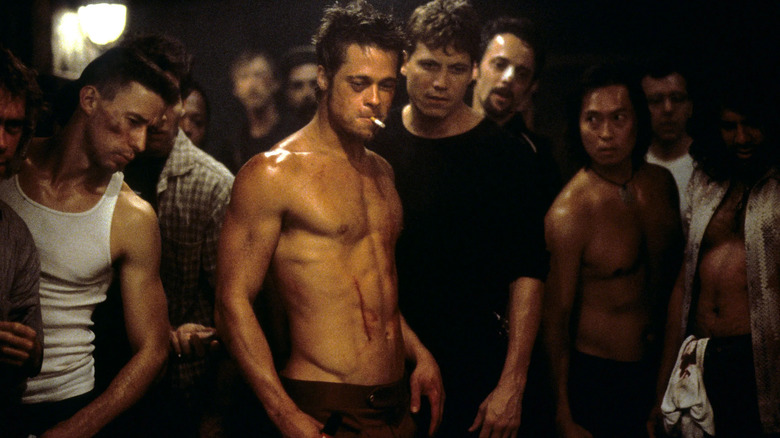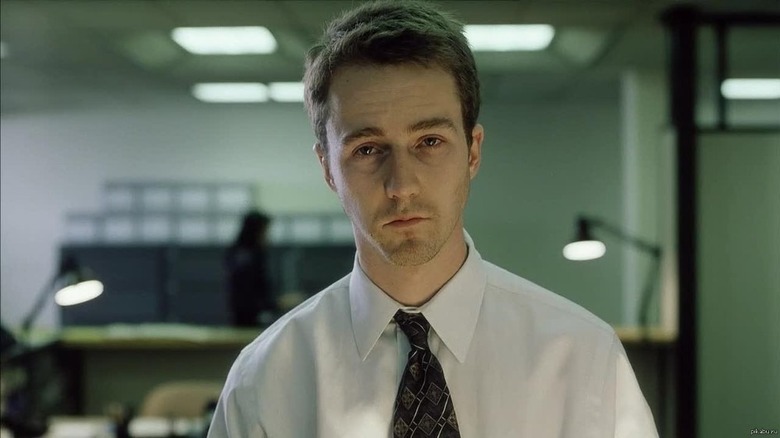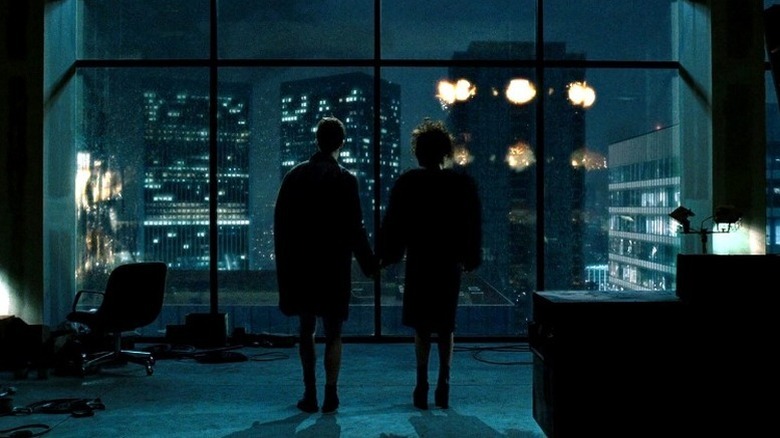The Coming-Of-Age Romantic Comedy That Inspired Fight Club
"Fight Club" is a grimy, dark examination of American masculinity and consumerism that has a lot more in common with the Mike Nichols romantic comedy "The Graduate" than you would think. Edward Norton plays The Narrator, an unnamed, miserable insurance salesman with insomnia who forms a fight club and terrorist organization against capitalism with a soap salesman named Tyler Durden (Brad Pitt). Both Norton and director David Fincher noticed similarities between "Fight Club" and "The Graduate," the story of the aimless college graduate Benjamin Braddock who starts an affair with his older neighbor, Mrs. Robinson.
This led producer Laura Ziskin to ask "The Graduate" screenwriter Buck Henry to join the project, but Henry did not recognize author Chuck Palahniuk's use of satire: "I don't think there's anything funny about it," he told Fincher (via The Ringer). The job ultimately went to Jim Uhls.
David Fincher saw "Fight Club" as the "nineties inverse" of "The Graduate," a humorous story about how the coming of age process extends with each new generation. In the book "David Fincher: Interviews," Fincher elaborated on the theme of arrested development in both films:
"It seemed kind of like 'The Graduate,' a seminal coming of age for people who are coming of age in their thirties instead of in their late teens or early twenties. In our society, kids are much more sophisticated at an earlier age and much less emotionally capable at a later age. Those two things are sort of moving against each other."
In "The Graduate," Benjamin (played by Dustin Hoffman) is terrified of starting his adult life after college while the Narrator finds adulthood deeply unsatisfying. Unlike Benjamin, who is so paralyzed by the endless choices and different paths laid before him that all he can do is drift in the pool, the Narrator "does not have a world a possibilities in front of him, he has no possibilities, he literally cannot imagine a way to change his life," Fincher notes in "David Fincher: Interviews." There are several other key parallels between "Fight Club" and "The Graduate."
Generational angst
"The Graduate" and "Fight Club" depict new generations rebelling against the expectations of older generations. The Narrator is chained to a monotonous corporate job: his insurance company is a bland row of cubicles with dead-eyed coworkers where everything's a copy of a copy of a copy. Consuming Starbucks and Ikea furniture is supposed to make him happy, but it doesn't. "Fight Club" explores Generation X ennui as a culture bogged down by materialism, which Edward Norton comments on in Everything Zoomer: "I'm of that generation. We've had our values dictated to us by an advertising culture that says, 'These are the external signifiers of your happiness you should aspire to. You're supposed to have the great car, the great clothes, the best girlfriend.'"
In "The Graduate," Benjamin is advised to go into "plastics," mundane and meaningless work that he has no interest in. By refusing to work a corporate job he hates for the rest of his life, Benjamin rejects the safe traditions of his parents' era. The Narrator of "Fight Club" wants to destroy corporate America itself. Benjamin will not conform to the post-war suburban American Dream, choosing instead to escape the strict control of parental authority by stealing his lover Elaine away from her wedding and going out on his own.
For Fincher, both films portray "that moment in time when you have this world of possibilities, all these expectations, and you don't know who it is you're supposed to be. And you choose this one path, Mrs. Robinson, and it turns out to be bleak, but it's part of your initiation, your trial by fire. And then, by choosing the wrong path, you find your way onto the right path, but you've created this mess."
The Narrator makes a mess of catastrophic proportions by destroying modern civilization, but it's also liberating; no longer a slave to the establishment, he unshackles the world from their crippling debt. Aside from narrative similarities, there was another element of "The Graduate" that Fincher wanted "Fight Club" to evoke.
A memorable soundtrack
Fincher wanted the Dust Brothers' music to be a strong part of "Fight Club," just as the Simon and Garfunkel folk-pop tunes in "The Graduate" were. Dust Brothers member John King told The Ringer, "David said, much to my chagrin, that he wanted music that sounded like it was from white guys who thought they were funky but really weren't. I was like, 'Thanks a lot.' But he was being creatively honest. We didn't have to try to deliver that — we were white guys that thought we were funky." It's also an unsettling electronic score with chaotic, energizing rhythms.
Much like "The Graduate," the ending of "Fight Club" features a song that captures the feeling of being isolated from the world around you. "The Sound of Silence" is a melancholy acoustic ballad that evokes the scene where Benjamin feels alone surrounded by a stifling crowd of adults pestering him about his future without bothering to hear his answer. No one listens to his apprehensions. Benjamin wants to make sense of his world first before deciding on his future, but the adults want him to have a plan. They are the people "talking without speaking, hearing without listening."
Similarly, "Where Is My Mind?" has a discordant, raw sound that puts you in the Narrator's disturbed mind. The Pixies warn the listener, "Your head will collapse if there is nothing in it," and you will unravel if you have no sense of true purpose outside of materialistic gains.
You would not expect "Fight Club," a bloody, stylized drama with an incendiary energy to have that much in common with a 1967 romantic comedy, but generational angst is timeless.


